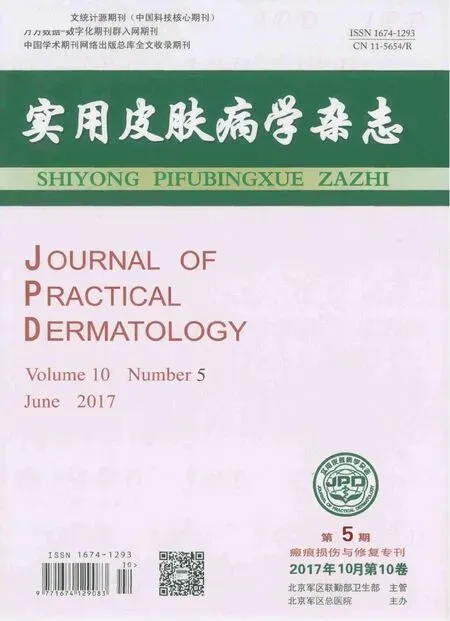脂肪间充质干细胞在系统性硬化症中的研究现状与展望
王松叶,王聪敏,陈 卫,杨蓉娅
脂肪间充质干细胞在系统性硬化症中的研究现状与展望
王松叶,王聪敏,陈 卫,杨蓉娅
间充质干细胞(mesenchymal stromal/stem cells,MSCs)是一种非造血多能干细胞。最近,研究发现MSCs具有免疫调节、血管生成和抗纤维化的能力,从而使以MSCs为基础的干细胞应用逐渐从再生医学领域转向对自身免疫性疾病的治疗研究。脂肪间充质干细胞(adipose mesenchymal stem cells,ASCs)是来源于脂肪组织的MSCs。该文回顾当前MSCs在系统性硬化症(systemic sclerosis,SSc)中的研究现状,并展望临床应用ASCs治疗SSc的可行性。
间充质干细胞;间充质干细胞,脂肪;间充质干细胞,骨髓;硬化症,系统性
在过去的20年中,早期对间充质干细胞(mesenchymal stromal/stem cells,MSCs)的研究重点主要集中在其分化能力方面。但是,自从发现MSCs具有免疫调节能力后,研究方向逐渐从再生医学转向MSCs对自身免疫性疾病治疗。目前,MSCs细胞治疗自身免疫性疾病方面的研究文献不断增加[1-3]。由于脂肪组织来源的MSCs极易获取、资源丰富,且具有免疫抑制能力,因此,在干细胞临床试验中,对脂肪间充质干细胞(adipose mesenchymal stem cells,ASCs)研究引起了人们更多的关注。
在自身免疫性疾病中,系统性硬化症(systemic sclerosis,SSc)是一种多系统的疾病,临床主要表现为自身免疫异常、血管异常和多脏器纤维化[4,5]。目前,对于SSc患者的治疗主要是对症处理和免疫抑制剂治疗[6]。虽然也有新的治疗药物出现,但对于SSc的预后情况和病死率并无明显改变[7]。近年,已有成功应用自体造血干细胞移植治疗难治性硬皮病报道,但其治疗对象主要是针对严重进展期的患者。MSCs具有免疫调节、血管生成和抗纤维化能力,理论上,MSCs可以同时治疗SSc 3个主要特征性病变:纤维化、血管生成和自身免疫缺陷,这些对于SSc的治疗将是一个突破[8]。
1 ASCs生物学特性
ASCs是指从脂肪组织中获取的MSCs。脂肪组织通过酶消化或机械破坏,可以获得一个个单个细胞群和基质血管碎片(stromal vascular fraction,SVF)[9]。将SVF细胞接种到塑料培养皿,其中贴壁的细胞经培养扩增,称为ASCs[9,10],其形态与成纤维细胞类似,有特定的免疫表型:CD29+、CD31+、CD34+、CD45+、CD73+、CD105+、CD90+[10,11]。同时,ASCs有黏附和多向分化潜能,可分化为脂肪、肌肉、软骨和骨组织细胞[12]。
ASCs极易获取,且产量很高。每1 ml脂肪分离的ASCs,经3或4代培养,就能获得超过10亿的ASCs细胞[13]。在获取的干细胞数量方面,ASCs比骨髓间充质干细胞(bone marrow mesenchymal stem cells,BM-MSCs)有显著优势。另外,有研究表明,长时间培养的BM-MSCs其分化潜能和增生能力受到限制[14],但在长时间培养的ASCs中并未发现这种现象[15]。以上这些特点使ASCs与其他类型间充质干细胞相比,在临床应用方面具有明显的优势。
2 ASCs免疫调节特性
与BM-MSCs类似,在体内外ASCs具有免疫抑制特性[16]。大量证据表明,ASCs和BM-MSCs抑制免疫反应是通过旁分泌机制实现[17]。研究发现,ASCs可分泌免疫抑制生长因子和炎症递质,如肝细胞生长因子(hepatocyte growth factor,HGF),吲哚胺2,3双加氧酶(indole 2, 3 double oxygenase,IDO)、前列腺素E2和转化生长因子-β(transforming growth factor-β,TGF-β)[18,19]。
ASCs具有将促炎Th1反应转换为抗炎Th2反应的能力,对自身免疫性疾病的动物模型有治疗作用,其中包括实验性结肠炎、自身免疫性甲状腺炎、实验性自身免疫性脑脊髓炎和类风湿关节炎。也有研究表明,ASCs可抑制移植物抗宿主病[20]和同种异体肝移植的急性排斥反应[21]。这些结果表明ASCs可以用来调节体内移植急性排斥反应,具有用于临床疾病治疗的潜力。迄今为止,研究发现细胞治疗的不良反应很小[22],甚至比现在临床应用的免疫抑制药物,如糖皮质激素、硫唑嘌呤、他克莫司和环孢菌素等所产生的不良反应还小。
3 MSCs在SSc中的研究现状
2008年,Christopeit等[23]首次报道,用同种异体BM-MSCs治疗了1例重症难治性硬皮病患者。2011年,德国研究团队报道,给4例难治性硬皮病患者进行同种异体骨髓间充质干细胞治疗[24],经18个月的随访,未见严重不良反应,其中有2例患者改良Rodnan皮肤评分(modi fi ed Rodnan skin score, mRSS)改善明显,肢端溃疡及远端肢体坏死情况也获得改善;另外,Guiducci等[25]也报道 1例急性四肢坏疽的SSc患者进行自体BM-MSCs治疗,经MSC静脉注射治疗后,血管造影检查显示肢体血循环重建,患肢完全治愈。
最近,研究证实了BM-MSCs对次氯酸硬皮病(HOCl- systemic sclerosis,HOCl- SSc)小鼠模型治疗作用[26]。研究发现,模型小鼠的皮肤和肺纤维化减少,组织中α-平滑肌肌动蛋白(α-smooth muscle actin,α-SMA)和TGF-β1表达下调。血清中抗Scl70抗体和晚期氧化蛋白产物(advanced oxidation protein products,AOPP)降低。有研究还证实,在免疫调节和组织修复方面,ASCs作用效果比BMMSCs更佳[27]。
有研究报道, SVF对SSc具有良好的治疗作用。Granel等[28]对12例SSc患者病变手指局部注射自体SVF治疗。经过6个月的随访,患者的多普勒检测评估、皮肤评分(mRSS)、Cochin's手功能评分、Raynaud's病情评分和生活质量等方面均有明显改善。但在SVF中,由于ASCs的数量比例在不同的个体脂肪组织中有所变化,这导致了治疗效果不一,因此SVF的广泛应用受到了限制。目前,SVF制备的异质性和制备程序标准化药品生产质量管理规范(good manufacturing practice,GMP)是其临床广泛应用的主要障碍。而与此相反,ASCs是一种严格的同质细胞,在细胞表型、功能、分离和扩增程序方面都符合GMP标准,而且具有强效和多效性作用,因此具有非常广泛的临床应用前景。
在SSc患者临床治疗中,Scuderi等[29]研究报道,在6例SSc患者受损皮肤区(面部或四肢)使用ASCs与透明质酸一起进行局部注射治疗,结果显示,患者皮肤厚度明显改善,且无局部并发症。这项临床研究成果更引起了人们进一步研究ASCs对SSc治疗作用的兴趣。
4 MSCs安全性
在MSCs治疗的安全性方面,最主要问题是干细胞治疗中是否存在致癌风险[30]。在对干细胞培养时已对传代细胞的遗传稳定性进行了研究[31],结果发现在MSCs培养中并没有出现永生细胞和核形异常细胞,因此MSCs治疗不存在致癌风险。最近有一项对1 000例接受MSCs治疗患者的meta分析结果表明, MSCs治疗过程中惟一出现的不良反应是短暂性发热[32],尚未发现其他不良反应。
5 展望
过去10年的研究工作证实,MSCs可能是治疗自身免疫性疾病的一种新方法。特别是MSCs具有免疫抑制、抗纤维化、促血管生成、抗氧化反应等作用,为多系统的难治性硬皮病的治疗带来了新希望。第一个应用MSCs治疗SSc的临床试验使用已经在法国展开。从临床前模型治疗得到的结果,以及临床疾病治疗的案例报道观察,这种治疗有非常广阔的应用前景。关于MSCs的来源,从目前研究观察,脂肪组织具有明显的优势。在这样的背景下,ASCs要在临床前硬皮病模型的治疗中取得令人信服的治疗效果,未来的研究将重点放在ASCs的功能鉴定和疗效分析、细胞制备的程序化及安全监管、根据患者的需要进行个性化细胞治疗,以及在SSc细胞治疗方面进行随机对照试验研究。
[1] Ben-Ami E, Berrih-Aknin S, Miller A. Mesenchymal stem cells as an immunomodulatory therapeutic strategy for autoimmune diseases [J].Autoimmun Rev, 2011, 10(7):410-415.
[2] Cipriani P, Carubbi F, Liakouli V, et al. Stem cells in autoimmune diseases: implications for pathogenesis and future trends in therapy[J]. Autoimmun Rev, 2013, 12(7):709-716.
[3] Cipriani P, Ruscitti P, Di Benedetto P, et al. Mesenchymal stromal cells and rheumatic diseases: new tools from pathogenesis to regenerative therapies [J]. Cytotherapy, 2015, 17(7): 832-849.
[4] Chighizola C, Shoenfeld Y, Meroni PL. Systemic sclerosis.Introduction [J]. Autoimmun Rev, 2011, 10(5):239-240.
[5] Desbois AC, Cacoub P. Systemic sclerosis: an update in 2016 [J].Autoimmun Rev, 2016, 15(5):417-426.
[6] Launay D, Savale L, Berezne A, et al. A monocentric experience of 13 patients, review of the literature and position paper of a multidisciplinary Working Group [J]. Presse Med, 2014, 43(10 Pt 2):e345-e363.
[7] Elhai M, Meune C, Avouac J, et al. Trends in mortality in patients with systemic sclerosis over 40 years: a systematic review and meta-analysis of cohort studies [J]. Rheumatology (Oxford), 2012,51(6):1017-1026.
[8] Cras A, Farge D, Carmoi T, et al. Update on mesenchymal stem cellbased therapy in lupus and scleroderma [J]. Arthritis Res Ther, 2015,17:301.
[9] Gimble JM, Katz AJ, Bunnell BA. Adipose-derived stem cells for regenerative medicine [J]. Circ Res, 2007, 100(9): 1249-1260.
[10] Zuk PA, Zhu M, Ashjian P, et al. Human adipose tissue is a source of multipotent stem cells [J]. Mol Biol Cell, 2002, 13(12): 4279-4295.
[11] Gronthos S, Franklin DM, Leddy HA, et al. Surface protein characterization of human adipose tissue-derived stromal cells [J]. J Cell Physiol, 2001, 189(1): 54-63.
[12] Gimble JM, Katz AJ, Bunnell BA. Adipose-derived stem cells for regenerative medicine [J].Circ Res, 2007, 100(9):1249-1260.
[13] Ra JC, Shin IS, Kim SH, et al. Safety of intravenous infusion of human adipose tissue-derived mesenchymal stem cells in animals and humans [J]. Stem Cells Dev, 2011, 20(8):1297-1308.
[14] Bonab MM, Alimoghaddam K, Talebian F, et al. Aging of mesenchymal stem cell in vitro [J]. BMC Cell Biology, 2006, 7:14.
[15] Jung Y, Bauer G, Nolta JA. Concise review: Induced pluripotent stemcell-derivedmesenchymal stem cells: progress toward safe clinical products [J]. Stem Cells, 2012, 30(1):42-47.
[16] Yanez R, Lamana ML, García-Castro J, et al. Adipose tissue-derived mesenchymal stem cells have in vivo immunosuppressive properties applicable for the control of the graft-versus-host disease [J]. Stem Cells, 2006, 24(11):2582-2591.
[17] Abumaree M, Al Jumah M, Pace RA, et al. Immunosuppressive properties of mesenchymal stem cells [J]. Stem Cell Rev, 2011,8(2):375-392.
[18] Hegyi B, Kudlik G, Monostori E, et al. Activated T-cells and proinflammatory cytokines differentially regulate prostaglandin E2 secretion by mesenchymal stem cells [J]. Biochem Biophys Res Commun, 2012, 419(2):215-220.
[19] Kang JW, Kang KS, Koo HC, et al. Soluble factors-mediated immunomodulatory effects of canine adipose tissue-derived mesenchymal stem cells [J]. Stem Cells Dev, 2008, 17(4):681-693.
[20] De Ugarte DA, Morizono K, Elbarbary A, et al. Comparison of multi-lineage cells from human adipose tissue and bone marrow[J].Cells Tissues Organs, 2003, 174(3):101-109.
[21] Wan CD, Cheng R, Wang HB, et al. Immunomodulatory effects of mesenchymal stem cells derived from adipose tissues in a rat orthotopic liver transplantation model [J]. HBPD Int, 2008,7(1):29-33.
[22] Newman RE, Yoo D, LeRoux MA, et al. Treatment of in fl ammatory diseases with mesenchymal stem cells[J]. Inflamm Allergy Drug Targets, 2009, 8(2):110-123.
[23] Christopeit M, Schendel M, Foll J, et al. Marked improvement of severe progressive systemic sclerosis after transplantation of mesenchymal stem cells from an allogeneic haploidentical-related donor mediated by ligation of CD137L [J]. Leukemia, 2008,22(5):1062-1064.
[24] Keyszer G, Christopeit M, Fick S, et al. Treatment of severe progressive systemic sclerosis with transplantation of mesenchymal stromal cells from allogeneic related donors: report of fi ve cases [J].Arthritis Rheum, 2011, 63(8):2540-2542.
[25] Guiducci S, Porta F, Saccardi R, et al. Autologous mesenchymal stem cells foster revascularization of ischemic limbs in systemic sclerosis: a case report [J]. Ann Intern Med, 2010, 153(10):650-654.
[26] Maria A, Toupet K, Bony C, et al. Anti-fibrotic, anti-oxidant and immunomodulatory effects of mesenchymal stem cells in HOClinduced systemic sclerosis [J]. Arthritis Rheum, 2016, 68:1013-1025.
[27] Maria A, Toupet K, Maumus M, et al. Human adipose mesenchymal stem cells as potent anti- fi brosis therapy for systemic sclerosis [J]. J Autoimmunity, 2016, 70:31-39.
[28] Granel B, Daumas A, Jouve E, et al. Safety, tolerability and potential ef fi cacy of injection of autologous adipose-derived stromal vascular fraction in the fi ngers of patients with systemic sclerosis: an openlabel phase I trial [J]. Ann Rheum Dis, 2015, 74(12):2175-2182.
[29] Scuderi N, Ceccarelli S, Onesti MG, et al. Human adipose-derived stromal cells for cell-based therapies in the treatment of systemic sclerosis [J]. Cell Transplant, 2013, 22(5):779-795.
[30] Mishra PJ, Mishra PJ, Glod JW, et al. Mesenchymal stem cells: fl ip side of the coin [J]. Cancer Res, 2009, 69(4):1255-1258.
[31] Miura M, Miura Y, Padilla-Nash HM, et al. Accumulated chromosomal instability in murine bone marrow mesenchymal stem cells leads to malignant transformation [J]. Stem Cells, 2006,24(4):1095-1103.
[32] Lalu MM, McIntyre L, Pugliese C, et al. Safety of cell therapy with mesenchymal stromal cells (SafeCell): a systematic review and metaanalysis of clinical trials [J]. PLoS One, 2012, 7(10):e47559.
Adipose-derived mesenchymal stem cells in systemic sclerosis: a review of recent advances and prospection
WANG Song-ye,WANG Cong-min,CHEN Wei,et al
The Zhurihe Base Hospital of People’s Liberation Army, Inner Mongolia 011299, China
Mesenchymal/stromal stem cells (MSCs) are nonhematopoietic multipotent progenitor cells. More recently, the discovery of MSCs immunomodulatory, angiogenic and anti fi brotic capabilities properties made MSCs-based therapy progressively slips from the fi eld of regenerative medicine to autoimmunity. Adipose mesenchymal stem cells (ASCs) are MSCs derived from fat. In this article, we review the current research status of MSCs in systemic sclerosis (SSc, Scleroderma), and expound the feasibility of clinical application of ASCs in the treatment of SSc.
Mesenchymal stem cells (MSCs),Adipose mesenchymal stem cells (ASCs),Bone marrow mesenchymal stem cells (BMMSCs);Systemic sclerosis (SSc)[J Pract Dermatol, 2017, 10(5):296-298]

王松叶
R593.25
A
1674-1293(2017)05-0296-03
10.11786/sypfbxzz.1674-1293.20170512
011299 内蒙古,朱日和训练基地医院(王松叶,陈卫);陆军总医院全军皮肤损伤修复研究所(王聪敏,陈卫,杨蓉娅)
王松叶,副主任医师,研究方向:硬皮病的临床治疗,E-mail:weichen1995@qq.com
杨蓉娅,E-mail: yangrya@sina.com
2017-04-10
2017-07-08)
(本文编辑 敖俊红)

